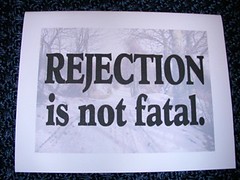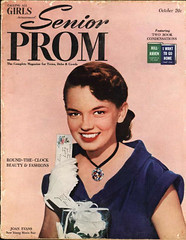 And now, a word in defense of literary journals.
And now, a word in defense of literary journals.
This might seem like the most unlikely of places to defend these magazines, given my splendid history with them (also, see here). They reject me pretty much at every turn, do not send tenderly written notes of praise, and often leave me insane with anger wondering how, just how, some pieces of inferior quality get happy acceptance but not mine.
The literary journal is one of our favorite targets, though such animals are often weak, defenseless creatures, usually with a reader base of less than 500, at least half of which are libraries. They serve as a platform for emerging voices and unrecognized brilliance, and more often than not, are a labor of love. You don’t get wealthy by publishing a lit magazine. You can’t make much of a living at it, either.
We love to hate them, of course, because in our minds, they love to hate us. Any writer who has spent ages crafting a story, sent it to something along the lines of Pigathon, The Literary Journal of the University of North Plattsville State Community College, and receives a form rejection letter knows the feeling. We page through Pigathon and say, “I can write better than this shit,” and when our stories are not accepted, it serves a double rejection – no publishing, but also no validation that our writing is any good.
Oh, yeah?
Worse are those journals—you fucks know who you are—who have the chutzpah to send a subscription card with the form rejection letter.
You’re not good enough to make it into Pigathon, your hours of toil mean nothing to us, and in fact, we’re having a good laugh right now at your expense. To think you had any talent!
Also, send us $10 for two issues of Pigathon, the literary journal that the online magazine Bloody Hell Snot called “interesting.”
For some of us, an encouraging word is all we ask for, a molecule of kindness, and the indignity of rejection along with a request to take my money…hell, it’s like being turned down for Senior Prom and then having the girl demand you to pay for her dress. (She’s going with the quarterback instead.)
But in the spirit of fairness, as well as my sanity, I will say that even those magazines that send you the mimeographed note are not necessarily evil by force of their actions. It’s a numbers game: some literary journals get hundreds of submissions a month; others get that many in a week. It’s amazing that anything gets read at all.
Many of these submissions are actually pretty good, I am told. Probably 1 percent are extraordinary, 10 percent excellent, 50 percent are good or very good, and the rest are fair, poor, or wretchedly, pathetically awful. (The top-tier have this thing called “agented fiction,” and while it is possible to get published over the transom at The New Yorker or The Paris Review, it’s more likely that a literary unknown will run into a famous writer on the street, start up a conversation, and suddenly have a new mentor named John Updike.)
In addition, most lit mags are staffed by unpaid volunteers, some who are actually quite intelligent and are above 19 years of age, and who take their work very seriously. They don’t reject you out of spite.
Why, you ask, am I doing this? Heaping tender praise upon what has been a Bookfraud bogeyman, a beast characterized as more evil than the hypothetical spawn of George W. Bush and Ann Coulter (an offspring so scary that young Damien the 666th would hide under the covers at the mere mention of its name?).
My “conversion” began when I ran into an acquaintance at a party about a week ago. This person also happens to be an editor of a pretty well-known lit magazine. The editor (who has rejected one of my stories) told me that the pub was getting about 100 to 200 manuscripts a week. Surprisingly, most of them aren't total garbage--half or more were average or not bad, a much smaller percentage were merely good, and very good, yet fewer still are truly excellent.
Not this year
The editor also related a story of working with a writer for weeks on a story, giving the writer detailed help on rewrites, only to have him pull the story at the end. Bad behavior works both ways.
In a way, that conversation crystallized a thought buried deep inside the soul, something I knew to be true but didn’t want to admit. The competition for many of these literary journals is extraordinarily high, and sometimes, the numbers just don’t work. You just have to take your rejections, drink a Scotch, and move on.
If you’re the editor of Pigathon, however, remember this. You have one of my stories, but I have your Social Security number. So if your credit rating suddenly tanks, you have no one but yourself to blame.
Monday, June 19, 2006
Literary Mags Aren't Evil. At Least Not All of Them
Subscribe to:
Comment Feed (RSS)


|